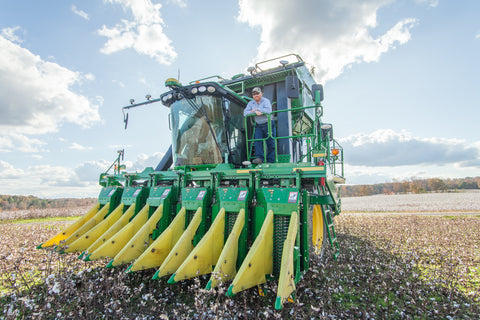Did you know that fashion e-commerce can be one of the most polluting, environmentally impactful consumer industries on the planet? From garments made in sweatshops with harmful chemicals and toxic blends to frivolous returns and excessive shipping, online apparel can leave a major stain on our planet. While as a clothing company we are inherently imperfect, our promise is to provide you with the most American-made, ethically-crafted, and environmentally-responsible apparel we can.
When we first thought about starting this company, one of the key questions we asked ourselves was “are we going to induce unnecessary consumption that further damages the environment?” In deliberating this quandary, we kept coming back to the idea that the cure for unquenchable consumption isn’t asking people to give things up, its delivering responsible products and building a brand that captures people’s goals for a better world while still offering style, comfort, and aspiration. That's what we seek to give you with Adirondack Field.
To give you a glimpse at what we’re doing differently, we put together a list of nine steps we’ve taken to reduce our impact and make the world a better place.
1. Timeless Fabrics
Our flannel patterns are based upon traditional designs that have withstood the test of time and resisted the cyclicality in fashion trends. We want you to always look good without having to buy more or new. The best way to reduce waste is to reduce consumption so our goal is to provide you with heirloom-quality shirts that you’ll wear forever.
2. Organic Cotton
Cotton is one of the most widely-grown crops in the world and traditional cotton is also one of the most chemically-intensive. The organic cotton in our GOTS-certified Cloudsplitter Organic Tees is grown, processed, dyed, and finished with methods that reduce the use of toxic pesticides and chemicals at the outset of product development.

Organic cotton is one of the most responsible fabrics available and can be found on all our Cloudsplitter Organic Tees.
3. Durability
The historic Japanese mills we work with for our flannels haven’t lasted this long because they put out cheap fabrics. They’ve survived the transfer of garment work to the developing world by producing the durable, luxury fabrics that customers are willing to pay for. We want your flannel to last!
4. Water-Based Dyes
Did you know that traditional screen printing is one of the largest sources of microplastics? Microplastics aren’t just in our drinking water and fish anymore either. Scientists recently found that small particles are evaporating with lake and ocean water and entering our food chain when they come down in raindrops on our crops. Our Cloudsplitter Organic Tees are garment-dyed with water-based inks to avoid this major pollutant entirely.
5. Off-Bias Flannel Design
This is our favorite! Did you know that original Adirondackers had to make their own clothes and as such designed their clothing to avoid fabric waste? We’ve taken a cue from our forbearers and designed our flannels in the same tradition. Typically, in modern times, flannels and plaids are found with either “in-line” or “on-bias” sewing. In-line sewing wastes the most fabric as the material sheet must be inefficiently cut to line up the pattern across all shirt components such as pockets, sleeves, collar, etc. On-bias sewing, or designs where specific shirt elements such as pockets and yokes are turned at a 45 degree angle, uses less fabric than in-line sewing but still requires such cutting practices for certain panels. Our off-bias designs avoid this practice for all components except our front panels, saving fabric and bringing us closer to our Adirondack roots!

We use the same "off-bias" sewing methodology as early Adirondack pioneers.
6. Packaging
Contrary to popular belief, mailers and bags are more efficient, take up less room, and are more sustainable than traditional boxes. To the extent we can, we try to use our custom polybags for shipments. When we do use boxes, particularly for items that can be damaged in shipping, we use boxes that are 100% recycled (95% post-consumer) and recyclable.
7. Common Sense Returns Policy
One of the greatest sources of environmental impact from e-commerce is returns. Specifically, many consumers have taken to ordering items in two sizes with the express intent to abuse free returns and send back at least one of the garments. This is wasteful. We try to be as clear as possible with our size charts and if you ever have questions on sizing, we encourage you to get in touch. We will always do right by our customers, but we also wanted to implement a returns policy that discourages folks from excessively purchasing and returning garments.
8. In-Factory Quality Control, Pre-Packing, and No-Frills
We’ve gone the extra length to perform quality control in the factory rather than on shipment arrival. Why does this matter? Any shipment of apparel from a factory comes with the shirts individually packaged to protect from catastrophic events; upon arrival, some companies unpack the shirts to perform quality control and then repackage them in new plastic, often with unnecessary garnishes like stickers and wax paper. By performing QA/QC at the factory with a trusted contract service provider, we eliminate the need for duplicative plastic packaging. Further, we don’t waste your money or the environment’s carrying capacity by including frivolous tagging or accoutrements.
9. Selling a Product You Love
Buy less, buy better. We sell you garments you love so you won’t need to buy as many new garments in the future. And, when we earn your loyalty, every purchase you make will be more environmentally-benign than alternatives in the market. We look forward to being your new favorite brand so we can improve the world together!
Thank you so much for your support of environmentally-responsible manufacturing and we look forward to supplying you with the most American-made and eco-conscious apparel we can!
